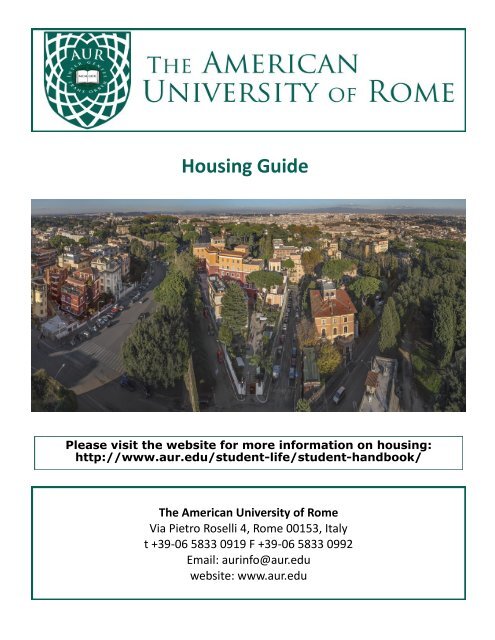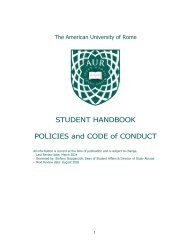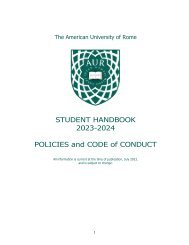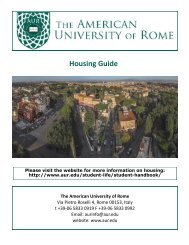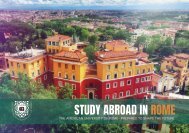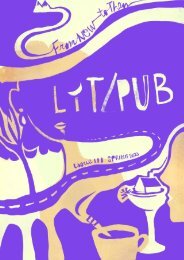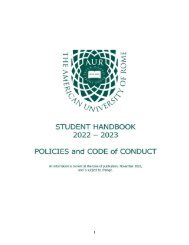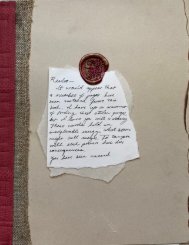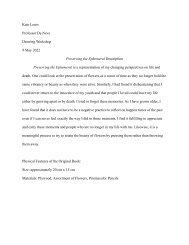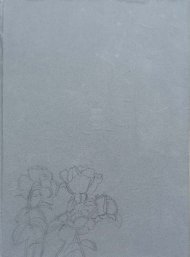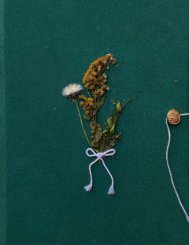AUR Student Housing Guide
Useful information fort AUR student accommodation.
Useful information fort AUR student accommodation.
Create successful ePaper yourself
Turn your PDF publications into a flip-book with our unique Google optimized e-Paper software.
<strong>Housing</strong> <strong>Guide</strong><br />
Please visit the website for more information on housing:<br />
http://www.aur.edu/student-life/student-handbook/<br />
The American University of Rome<br />
Via Pietro Roselli 4, Rome 00153, Italy<br />
t +39-06 5833 0919 F +39-06 5833 0992<br />
Email: aurinfo@aur.edu<br />
website: www.aur.edu
Useful Numbers<br />
Emergency number (Ambulance, Fire Brigade,<br />
Police, Carabinieri)<br />
112<br />
MedinAction (House Call Doctor) 3204065709<br />
Salvator Mundi International Hospital 800 402 323/ 06 588 961<br />
Taxi 06 3570/ 06 4994/ 06 5551<br />
The American University of Rome 06 5833 0919<br />
US Embassy 06 46 741<br />
<strong>AUR</strong> Emergency Phone 348 080 9357<br />
ICI <strong>Housing</strong> Agency (including lockouts) 339 212 2127<br />
<strong>AUR</strong> Facilitated <strong>Student</strong> <strong>Housing</strong> - Routine maintenance or service<br />
TO MAKE A MAINTENANCE REQUEST LOG INTO My<strong>AUR</strong>, GO<br />
TO THE STUDENT LIFE TAB; CLICK ON HOUSING ON THE FAR<br />
LEFT COLUMN; THEN CLICK ON HOUSING MAINTENANCE RE-<br />
QUEST. ONCE YOU HAVE FILLED OUT THE MANDATORY SEC-<br />
TIONS, CLICK ON SUBMIT TO SEND YOUR REQUEST TO THE<br />
HOUSING AGENCY.<br />
For emergencies:<br />
In the case of a housing related true emergency you can call<br />
your <strong>Housing</strong> Agency emergency number at any time.<br />
<strong>Housing</strong> Agency emergency number<br />
Luigi or Mirko<br />
339 212 2127
What can you expect to find in the<br />
Roman Apartment/Condominium?<br />
Each apartment is equipped with basic furnishings and supplies, including:<br />
• Single beds<br />
• Bed linens and towels (Set of sheets, 2 set of towels, 1<br />
bath mat per bathroom, 1<br />
blanket/comforter/bedspread, 1 pillow)<br />
• A closet/clothing storage space<br />
• Basic cookware and tableware (kitchen supplies: pans,<br />
skillets, cooking utensils, serving utensils, mixing bowls,<br />
serving bowls/platters, coffee pot, glasses, mugs, cutlery, strainer)<br />
• A table and chairs and a furnished sitting area<br />
• Washing machine<br />
• Iron and ironing board<br />
• Trash cans<br />
• Microwave<br />
• Fans<br />
• Unlimited, no additional cost access to the Internet*<br />
• Landline phone* (it will provide unlimited calls to landlines<br />
in Italy. Calls to cellular phones and calls outside of<br />
Italy incur additional cost and can be effected with the use<br />
of a calling card. Unlimited incoming calls may be received<br />
without incurring any additional cost.)<br />
* In the event a particular unit is not<br />
equipped with internet/phone line, a cellular<br />
phone will be provided and a partial refund<br />
made. Computer and phone are shared among unit residents.<br />
Not All Apartments Are the Same<br />
In Rome, not all apartments are created equal. Although the apartments vary<br />
in location, style and size, all of them provide the essentials.<br />
Please try to understand this fact and accept it as part of your experience in<br />
Rome. Do not immediately compare your apartment with those of other students.<br />
*In the event a particular unit is not equipped with internet/phone line,<br />
a cellular phone will be provided and a partial refund made. *<br />
Respect the host culture<br />
You may experience culture shock or transitioning to the Italian culture. Attempt<br />
to understand and learn more about this culture throughout the duration of your<br />
time here.
Helpful <strong>Housing</strong> Hints<br />
Electrical Power<br />
• All the apartments in Rome operate with a 3 kilowatt fusebox. This means<br />
that an overload of power will leave you in the dark.<br />
• Be careful when using American appliances with an adapter; that usually<br />
puts an extra load on the power supply.<br />
• To prevent damage to the electrical system as well as to your own appliances,<br />
never overload the electrical outlets with multi-outlet power strips.<br />
• Never yank wires from an outlet as you may take the outlet casing with it. While using<br />
one hand to support the outlet, gently pull the plug out with your other hand.<br />
• Be careful of using many appliances simultaneously: the water heater, and another appliance<br />
(i.e., hair dryer, washing machine) will blow the fuse!!<br />
• Should this happen, your power will be cut off – turn off any electrical appliance and light<br />
fixture you don’t truly need at the moment and check your fuse box to flip your apartment<br />
switch back on<br />
• Electricity in Italy is 220 volts (110 in the US). If you have brought appliances with you,<br />
you may need a power converter (convertitore) You can buy one at a ferramenta<br />
(hardware store). If the prongs do not fit into the wall outlet, do not force it in. You may<br />
need an adaptor (adattatore) that you can buy at a ferramenta.<br />
Gas<br />
Be extremely careful with gas. Make sure to light the flame immediately and to<br />
turn it off carefully after use. There is usually an on/off (aperto/chiuso) gas lever<br />
on the wall near the stove or under the sink - make sure it is always off if you are<br />
not using it.<br />
Keys<br />
• Apartment keys in Italy are a different style<br />
• Be sure that you are unlocking/locking your door appropriately to maintain safety in the<br />
home<br />
• Lost keys are your responsibility<br />
• The University does not have copies of keys<br />
• Contact the agency for any key issues or replacements<br />
Water Heater<br />
Do not expect to take 30 minute hot showers. Hot water is not always readily available.<br />
All of the hot water in the tank must be shared between all tenants. So be<br />
considerate of the person taking a shower after you and limit your shower to about<br />
5 minutes. It takes about 2 hours for the water in the tank to reheat. The water is<br />
reheating when the red light is on and finished reheating when the red light is off.<br />
Conservation in Italy<br />
Italians, like their fellow Europeans, are great conservationists and are very practical about<br />
conserving their resources, especially given the high cost of energy which is many times higher<br />
than typical U.S. utility rates. You will find these efforts affect water, electricity, heating fuels,<br />
transportation fuels and even space. While you may find it challenging, we hope it becomes<br />
one of the many positive lessons you will take home with you.
Washing Machines<br />
You will immediately note a difference between American and European<br />
washing machines: the latter are “front loading”, i.e., there is no top lid<br />
but instead a front door. Because water can spill out and potentially<br />
cause damage, these front doors have a special timed lock and will not<br />
open when cycles are actively running. Wait few minutes after the cycle<br />
is completed/ after you turned it off.<br />
DO NOT FORCE YOUR WASHING MACHINE OPEN.<br />
European manufacturers supply their appliances to many nations and therefore your<br />
washing machine control panel may have symbols instead of Italian wording. Should<br />
you have trouble understanding the control panel or simply don’t know how to operate<br />
your unit’s washer, contact the agency for an appointment so that they can demonstrate<br />
to you and your roommates.<br />
THE HOUSING AGENCY WILL SET YOUR WASHING MACHINE<br />
FOR A ‘DEFAULT PROGRAM’ VALID FOR MOST WASHING:<br />
40° C + SPIN CYCLE + DRAIN.<br />
YOU JUST HAVE TO PUSH THE START BOTTON.<br />
Most common mistake: Push all buttons (it will deactivate some of the preset<br />
up controls, such as spin cycle or drain; set a too high temperature, that<br />
will damage your clothes.<br />
Washing machines usually have 2 knob controls:<br />
one with cycle types and one with<br />
temperature. Loads can generally take up to<br />
2 hours or even longer, so plan ahead, coordinate<br />
with your roommates and perhaps<br />
consider sharing the loads. Bear in mind the<br />
Italian quiet hours laws before starting a<br />
load late in the evening.<br />
Here is the most common wording for washing machines:<br />
Cotone e resistenti<br />
Delicati<br />
Sintetici<br />
Lana<br />
Colorati e misti<br />
Rapido<br />
Molto sporco<br />
Sporco normale<br />
Prelavaggio<br />
Risciacquo<br />
Risciacquo energico<br />
Risciacqui delicati<br />
Centrifuga<br />
Solo scarico<br />
CYCLE TYPES<br />
Cotton and non delicate<br />
delicate clothes<br />
Delicate<br />
Synthetics<br />
Wool<br />
Colored and mixed ones<br />
Quick wash<br />
Very dirty<br />
Normal<br />
Pre-wash<br />
Rinsing<br />
Powerful rinse cycle<br />
Delicate rinse cycle<br />
Spin cycle<br />
Drain only<br />
90° C<br />
TEMPERATURE<br />
Hot - Very dirty cotton or linen<br />
whites (towels, table clothes, sheets)<br />
60° C Warm - Dirty cotton whites<br />
30°/40° C<br />
Dirty color clothes, mixed color,<br />
whites, delicate materials<br />
Cold
HEATING<br />
Heating in most apartments is controlled by the condominium and is turned on according to<br />
the needs of the majority of residents. Although it varies from building to building, this is generally<br />
sometime between 5, 6 or 7 am and 9 or 10 am, and again for a few hours before 10 or<br />
11 pm. Heat cannot be on between 11 pm and 5 am. This means that the hours in between<br />
heating are what you could call “Roman room temperature”, which is slightly warmer than the<br />
temperature outside. Italian law dictates that condominium administrated heating must be on<br />
twice daily from November 15 until March 15. Severe fines can be imposed by local officials<br />
against those found violating the Italian law governing these limits.<br />
If your heat works in some rooms but not others, please contact<br />
your housing agency so that they may check your radiator(s).<br />
Should there be a sharp drop in outdoor temperatures, expect to notice the difference<br />
even in your unit; it will naturally become harder for your furnace to heat your<br />
unit/building. If you still suspect that your heat is not working, you should:<br />
• let the agency know as early in the day as possible – waiting until late afternoon or<br />
the weekend will hinder their ability to service your unit on a timely basis.<br />
• check the different rooms in your unit – it could just be that one particular radiator<br />
isn’t working. If you’ve got this particular problem, send a maintenance request specifying<br />
which radiator needs to be serviced.<br />
• never play with your thermostat – you could actually be turning the system off!<br />
• ask the agency to find out specifically what time your unit’s condo association has decided<br />
to heat the building – students sleeping through their heating hours is not unheard<br />
of.<br />
• never use stoves and ovens for their heat – these are NOT suitable heating solutions<br />
for you and your roommates.<br />
Warm Water<br />
Almost all Roman apartments are furnished with a water heating tank located either in the<br />
bathroom or the balcony. In the tank, there is generally enough warm water to take quick<br />
showers. Please expect few minutes before warm water arrives and at least a couple of hours<br />
to replenish the supply. Please bear in mind that it is not possible to have hot water coming<br />
from different faucets at the same time, so if you use it in the bathroom you won’t be able to<br />
use it in kitchen. Should you suspect that your water heater is not working, you should let the<br />
agency know as early in the day as possible or anyway by 24-48 hours.<br />
never play with the controls on your water heater ,<br />
you could actually be turning the system off!<br />
Drains<br />
Just like back home, hair, food and other matter will clog drains. Be careful of what you allow<br />
to go down any drain and be conscientious about wiping your sinks, tubs and showers of hair,<br />
food, etc. Your kitchen sink will not have a garbage disposal – garbage must go into garbage<br />
bags.
You’re All Moved In<br />
• Memorize your address and how to get home<br />
• Do not keep your address attached to your keys<br />
• Always secure doors and windows when you exit the apartment or go to<br />
bed<br />
• Remember 2 things when you will be away overnight...<br />
• Who to tell<br />
• Who NOT to tell<br />
Common American conveniences students have told us<br />
they missed here in Italy:<br />
More storage space<br />
More warm water<br />
More heat<br />
Central air and heat<br />
Unlimited electrical supply<br />
Bigger beds<br />
Bigger showers and tubs<br />
Clothes dryers<br />
Bigger fridges<br />
Distance from neighbors<br />
Spacious kitchens<br />
Elevators<br />
Electric stoves and ovens<br />
Better water pressure<br />
Screen windows<br />
Ice<br />
Garbage disposals<br />
Dish washers<br />
Unlimited heat<br />
24 hour store openings<br />
Larger toilet tanks<br />
American style plumbing<br />
Box spring mattresses<br />
Sidewalks<br />
Better phone & internet service<br />
More electrical outlets<br />
Spacious kitchens<br />
Screen windows<br />
Microwaves and toasters<br />
Private means of transport<br />
American TV channels and<br />
shows<br />
BEHAVIOR<br />
• Italian quiet hours laws must be respected.<br />
• Common rules of Italian etiquette must be observed.<br />
• It is prohibited to bring animals, stereos, speakers, televisions, musical<br />
instruments, or heaters into the apartment. It is also prohibited to place<br />
nails in the walls or to remove furnishings. Tape and “blu-tack” also<br />
cause damage and cannot be used on the walls.<br />
Candles, incense or any other materials that produce<br />
an open flame are not allowed.<br />
• Overnight guests are not permitted.<br />
• All apartments are non-smoking environments.
GOOD NEIGHBOR POLICY<br />
To help maintain good relations with your<br />
neighbors keep the following in mind<br />
• You are part of a community and your actions affect your neighbors<br />
• Although your residency is temporary, recognize that most of your<br />
neighbors are living in their primary residence which they own<br />
• Please be sensitive to the lifestyle of your neighbors. Most residents enjoy<br />
the arrival of American students and you should do your part to foster<br />
that relationship<br />
• Most residents work full time and many may have families with young<br />
children, so keep excessive noise to a minimum at all times<br />
• You should remember that although the housing facilities are not directly<br />
provided by the University, your behavior reflects on the University and<br />
can affect future students’ living arrangements<br />
Daily Quiet Hours:<br />
10:00pm - 7:00am<br />
1:00pm - 4:00pm
Ways (NOT) to Meet Your Italian Neighbors<br />
● Flick cigarettes and ashes from your window or balcony<br />
● Hang out on your terrace talking loudly (or even softly, but at 3 am when you could hear a pin drop)<br />
● Drag furniture across the floor without lifting it<br />
● Watch a DVD in your bedroom—which happens to be right above/under/next<br />
to your neighbors’ bedroom<br />
● Ignore the quiet hours laws<br />
● Hang out in the stairwell, smoking, drinking and, well, just hanging out<br />
● Forget that, in the “real” world, the weekend doesn’t start on Thursdays<br />
● Bring home strangers who couldn’t care less about your neighbors,<br />
nor about your reputation with the neighbors<br />
● Leave your trash bags in the building entrance or stairs<br />
● Return to your building, drunk and noisy<br />
● Leave your building, drunk and noisy<br />
● Stay home for the night, drunk and noisy<br />
● Neglect to tell your visitors which apartment you’re in so that they buzz<br />
everyone in your building until they find you<br />
● Greet your best friend who’s visiting from home by screaming your hellos in the stairwell<br />
● Wear hard-soled shoes inside apartment<br />
● Forget to close the elevator doors properly so that no one else can use it<br />
● Pile into the elevator with too many people, so that it breaks and the neighbors not only can’t use it,<br />
they have to pay an expensive technician to fix it<br />
● Talk loudly in the stairwells or other public areas of your building<br />
● Let doors slam behind you<br />
● Not dispose of your trash properly and promptly, so that you attract bugs into your building<br />
● Answer your door wearing only a towel<br />
● Use the informal “ciao” instead of the preferred and respectful “buon giorno”, “buona sera”, or “salve”
<strong>Student</strong>s in <strong>AUR</strong> University <strong>Housing</strong> are reminded…<br />
…that overnight guests are prohibited.<br />
Should you need a place<br />
for your visiting friends or relatives,<br />
please ask any of the<br />
<strong>AUR</strong> <strong>Student</strong> Life staff for<br />
a list of local lodgings.<br />
Thank you!
Security Advice<br />
When going to bed or leaving<br />
your apartment CLOSE all windows,<br />
shutters and blinds<br />
securely, and use your keys to<br />
best lock up your doors.<br />
Never tell anyone outside your<br />
trusted <strong>AUR</strong> community of you<br />
and your roommate’s travel plans.
CULTURAL DIFFERENCES<br />
PERCEPTION OF DISTANCE<br />
Public Transportation: You should be prepared to use the public transportation system.<br />
Public transportation is available 24/7 in various forms. The most common evening<br />
form is the night bus (notturno), which runs approximately twice an hour. Resources on<br />
how to determine which bus to take are explained on page 14. Taxis are also a convenient<br />
(though more expensive) alternative.<br />
Walking: Be prepared for a new concept of ―far. In Rome, anything within a 20/30 minute<br />
walk is considered ―close. Often times, especially in the center, transportation<br />
can be unreliable and it is quicker to walk than wait for the bus. During your stay, you<br />
may not get to see more than a small fraction of the entire city!<br />
PERCEPTION OF SAFETY<br />
Residential Areas: Residential areas tend to be very busy during working hours approximately<br />
8:00 a.m. – 8:00 p.m. When stores close, however, the quiet is sometimes unsettling<br />
to students. All of the areas in which <strong>AUR</strong> places students are among the safest.<br />
This is not to discount the fact that students are living in an urban setting, and<br />
proper discretion should always be exercised.<br />
Graffiti: While particularly unnerving to some residents, the presence of graffiti in Rome<br />
does not denote a gang presence. Rome is an exceptionally safe city. Petty theft and<br />
pick-pocketing is common, but there are very few instances of violent crime.<br />
APARTMENT SAFETY<br />
Many of the housing rules are set in an effort to ensure student safety. In addition to<br />
the housing rules, please bear the following in mind:<br />
In your apartment, keep your shutters and serrande closed at night and whenever<br />
you’re not home. Always speak to any person who has buzzed your apartment through<br />
the intercom system to make sure you know who it is before you buzz them into your<br />
building – never buzz in or hold the door open for someone you don’t know. If they<br />
have an honest reason for being there, there should be someone there to allow them<br />
in. Crimes in Italy are generally petty crimes of opportunity – just don’t leave that opportunity<br />
open!<br />
Do not invite mere acquaintances into your apartment - Italians socialize in public places<br />
and no one expects you to invite them in. Italians would never dream of inviting a<br />
stranger or new acquaintance to socialize in their homes, most especially during quiet<br />
hours, and might never even invite their friends! By crossing this commonly accepted<br />
boundary, you might inadvertently send the wrong message. All students - but in particular<br />
females - should be aware of the social and potentially legal implications of inviting<br />
guests into their homes.<br />
Only give details of your or your roommates’ travel plans to your trusted <strong>AUR</strong> community<br />
and never to strangers or acquaintances.
Transportation<br />
Public Transportation<br />
BUS TRAM METRO TAXI<br />
ticket<br />
cost<br />
100 minutes € 1.5<br />
1 day € 6<br />
3 days € 16.5<br />
1 week € 24<br />
1 month € 35<br />
Prices are subject to change<br />
Tickets can be purchased at Metro Stations and Tabacchi stores.<br />
You can buy the monthly rechargeable card at Tabacchi stores for €3 and charge it<br />
after the 25th of each month either on line at www.atac.roma.it/canalivendita or in<br />
any Tabacchi store.<br />
As well as Google Maps, there are several apps designed specifically for Rome that<br />
you can use to navigate around the city, and which update the transport lines in real<br />
time. These are Moovit and Muoversi a Roma
BUS AND TRAM STOPS<br />
# of the bus<br />
Name of the<br />
stop<br />
Night<br />
line<br />
Departure address<br />
Destination<br />
address<br />
ATAC (Rome’s bus company) Website: www.atac.roma.it
Taxi Information<br />
Official licensed Roman taxis are<br />
white, with a sign on the roof and the<br />
driver's license information on the<br />
door.<br />
For information about using Roman taxis<br />
(practical advice, fares, your consumer rights),<br />
go to: www.viviromaintaxi.eu<br />
Accessing a taxi: Call or go to the nearest taxi stand<br />
Taxi phone numbers<br />
06/3570 06/4994 06/88177 06/5551<br />
Or download itTaxi app<br />
Limo Service<br />
GIANLUIGI MANCINI: +393381163017
RECYCLING IN ROME<br />
You have to take out your garbage<br />
to the bins on the streets<br />
Recycling is mandatory in Italy<br />
normal<br />
waste<br />
Plastic, Aluminum<br />
Paper, carton boxes<br />
glass<br />
organic<br />
waste
Check - out Procedure<br />
All University <strong>Housing</strong><br />
• Accommodations must be vacated no later than the morning of your assigned check-out date.<br />
It is not possible to extend the occupancy beyond these dates.<br />
• Check well in advance that you have your tickets and passport so that should they be lost,<br />
you have time to get them replaced before leaving.<br />
• Leave your unit in broom-clean condition.<br />
• Leave your washer & fridge empty and clean.<br />
• Remove all personal belongings.* (Do not remove linens or other items belonging to the<br />
agency.)<br />
• Turn off all lights.<br />
• Turn off all faucets tightly.<br />
• Double-check the kitchen to make sure the gas is turned off.<br />
• All kitchen items must be washed and put away; kitchens must be left in clean condition.<br />
• Strip your bed and leave all linens on top of your own bed.<br />
• Leave all towels in the bathroom.<br />
• Remove all and any trash to your nearest dumpster.<br />
• Close all doors, windows and serrande securely.<br />
• Return all library books (to the Library!)<br />
Failure to comply may result in charges to your financial account. Please note that your<br />
transcripts will be withheld should your financial account not be in good standing.<br />
<strong>AUR</strong> Resident <strong>Student</strong>s, please note: You remain subject to the <strong>AUR</strong> <strong>Student</strong> Code of Conduct<br />
while on campus or in university facilitated housing until you have departed.<br />
<strong>AUR</strong> Study Abroad <strong>Student</strong>s, please note: You remain subject to the <strong>AUR</strong> <strong>Student</strong> Code of<br />
Conduct while on campus or in university facilitated housing until you have fully departed.<br />
By agreement with all study abroad institutions, violations and sanctions of this Code can<br />
and will be enforced at your home university.<br />
Regrettably, in the past, students have been sanctioned and even expelled as late in the<br />
semester as after final exams. We thank you for continuing to represent yourself, your<br />
nationality and <strong>AUR</strong> in a positive manner.<br />
A few last things…<br />
• Leave your keys on the kitchen table or counter.<br />
• Damage charges will be divided equally amongst all occupants, so if anyone is responsible<br />
for any particular damage, now is the time to make it known to the <strong>Housing</strong> Office.<br />
Any outstanding damage charges will be charged to your financial account.<br />
• Need a ride to the airport or information about storage facilities?<br />
• Local airport transfer and storage information flyers can be found next to the Bldg<br />
A vending machine.<br />
<strong>AUR</strong> Study Abroad <strong>Student</strong>s, please note: You do not need to request a transcript from <strong>AUR</strong><br />
– your grades will automatically be sent to your study abroad program / home university at the<br />
end of the semester, as long as your financial account is in good standing.
Culture Shock<br />
Adjusting to a new culture is not always easy. Living away from family and friends,<br />
language barriers and different habits of the new culture may make life seem stressful<br />
and difficult. Going through a period of culture shock – feeling tired, lost, nervous<br />
and sad – is normal and can be quite easily tackled by taking steps in adjusting to<br />
the new culture. Here are some strategies to help combat the stress produced by culture<br />
shock.<br />
Be patient. Living abroad, changing cultures and adapting to new situations takes time.<br />
Do not rush things and allow yourself to feel sad about the things that you have left<br />
behind: your family, your friends, etc. Recognize the sorrow of leaving your home<br />
country, but learn to also accept the new culture you are in. Focus your power on<br />
getting through the transition.<br />
Maintain contact with the new culture and try to learn the language. Volunteer in community activities<br />
that allow you to practice the language that you are learning. This will help<br />
you fill your time, feel useful and stress less about the language at the same time.<br />
Maintain confidence in yourself. Follow your ambitions and continue your plans for the future.<br />
Learn to be constructive and find ways to live with the things that do not satisfy<br />
you 100%. If you encounter an unfavorable environment, learn from it, but at the<br />
same time be easy on yourself. Everything – including yourself – cannot, will not and<br />
does not have to be perfect.<br />
Maintain contact with your own ethnic group. Pay attention to relationships with your family<br />
and at work. They will serve as support for you in difficult times. This will give you a<br />
feeling of belonging and will reduce your feelings of loneliness and alienation. Do not<br />
forget the good things you already have!<br />
Develop a hobby. Relaxation and meditation are proven to be very positive for people who<br />
are passing through periods of stress. Learn to include a regular form of physical activity<br />
in your routine to help combat the sadness and loneliness in a constructive manner.<br />
Establish simple goals and evaluate your progress as time passes. The internet provides a myriad of<br />
information on anxiety, depression and related conditions. For further information<br />
please consult the following websites:<br />
http://www.ulifeline.org/<br />
http://www.nimh.nih.gov/<br />
http://www.nmha.org/<br />
http://www.afsp.org/
ROOMMATE RIGHTS & RESPONSIBILITES<br />
1. Read and study free from undue interference, unreasonable noise, and<br />
other distractions inhibiting the exercise of this right.<br />
2. Sleep without undue disturbance from noise and other distractions.<br />
3. Expect that others will respect your personal belongings.<br />
4. A clean environment in which to live.<br />
5. Free access to your room at all times.<br />
6. Personal privacy within the limits of the residential setting.<br />
7. Refuse guests in your room.<br />
8. Freedom from fear of intimidation and physical or emotional harm.<br />
9. Discuss with the <strong>Student</strong> Life Office members any problems or concerns<br />
which may arise.<br />
10.Expect that these rights will be respected.<br />
11.Verbally express your views to the person(s) involved, should you feel<br />
your rights have been infringed upon.<br />
12.Treat your roommate(s) with respect and consideration.<br />
13.Be responsive to all reasonable requests of your roommate(s).<br />
14.Accept responsibility for personal and community safety.<br />
15.Discuss your expectations regarding visitors.<br />
16.Inform your visitors of behavioral standards and expectations of both<br />
the college and your roommate(s).
<strong>AUR</strong> <strong>Housing</strong><br />
Roommate Agreement Preparatory Worksheet<br />
Things to Think About Before Roommate Agreement Meeting<br />
These questions are designed to help guide you through the conversation of developing house rules agreed upon by all roommates in<br />
your apartment. Please think about these questions in preparation for the Roommate Agreement Meeting with <strong>Student</strong> Life and your<br />
roommates.<br />
PERSONALITY<br />
You can tell I’m in a good mood because:<br />
You can tell I’m in a bad mood because:<br />
Something that will cheer me up when I’m “feeling down” is:<br />
Things I prefer to do by myself are:<br />
Things I prefer to do with others are:<br />
I prefer to go to bed at _____ pm and wake up at _____ am<br />
I would describe my sleeping habits as (light vs. heavy sleeper):<br />
MAINTENANCE<br />
How will we communicate that a maintenance request has been submitted?<br />
If someone causes damage in the apartment, how will it be handled? (All residents will be billed for damages unless the person who did<br />
the damages tells a staff member they are responsible.)<br />
If someone loses their keys, how will it be handled?<br />
HOUSEKEEPING<br />
How will cleaning, washing the dishes, and taking out the trash be handled and/or assigned?<br />
What are the specific housekeeping assignments?<br />
Housekeeping tasks will be completed how often?<br />
If your roommates think you should be neater, how would you like them to confront you?<br />
What consequences should be in place for a roommate or roommates not abiding by the housekeeping rules?<br />
QUIET HOURS<br />
If you and your roommates have different times when you wake up / go to sleep, how will this be handled (i.e. no phone conversations<br />
when other roommates are sleeping)?<br />
If you are making too much noise, how would you like your roommate(s) to confront you?<br />
What consequences should be in place for a roommate not abiding by the quiet hours rules?<br />
Is there a designated ‘lights out’ time in the rooms?<br />
STUDY TIME<br />
Will studying/homework/projects be allowed in the bedrooms?<br />
Will there be designated areas for studying/homework/projects in the apartment?<br />
If studying is allowed in the bedrooms, what can be occurring simultaneously (music, computer, films)?<br />
What consequences should be in place for a roommate not abiding by the study time rules?<br />
PERSONAL PROPERTY<br />
What items can be shared between you and your roommates and which may not?<br />
Are there items you’d like your roommates to ask your permission to use before they are borrowed?<br />
How will the refrigerator space be shared?<br />
How will food purchasing work? Is food sharing allowed all of the time, some of the time, or none of the time?<br />
If a roommate eats another roommate’s food, then will this food be replaced or added to a grocery list?<br />
Can a roommate sit on another roommate’s bed or use their computer without their permission?<br />
What consequences should be in place for a roommate not abiding by the personal property rules?<br />
VISITATION<br />
Please Note: It is an <strong>AUR</strong> policy that overnight guests are strictly prohibited, and there are also visitor policies; please refer to page 47<br />
of your <strong>Student</strong> Handbook.<br />
How well or long do you need to know someone before they should be invited in?<br />
How much notice (if any) is needed before a visitor can be brought to the apartment?<br />
How often is too often for a visitor to visit?<br />
Are there times when you would prefer friends of the opposite sex not to be in the apartment or bedrooms?<br />
If a roommate is bothered by a visitor, then what should be done?<br />
Should visitors be allowed to use any of your belongings?<br />
Should visitors be present in the apartment or room when you are studying?<br />
What are the rules involving public displays of affection in the room? For example, is kissing with a significant other in the same room<br />
acceptable when a roommate is present?<br />
What consequences should be in place for a roommate not abiding by the visitation rules?<br />
BEHAVIOR/CONFLICT<br />
If you do something your roommate doesn’t like, how would you like for your roommate to handle it?<br />
How would you and your roommates attempt to resolve a disagreement that you have?<br />
Is online communication (e-mail, IM, Facebook) acceptable to resolve issues or is face-to-face communication preferred?<br />
How will phone messages be taken?<br />
If one roommate feels disrespected, how will this be resolved?<br />
What are the expectations involving alcohol usage and behavior?<br />
This Roommate Agreement Form was adapted, with permission, from the University of Philadelphia.
<strong>AUR</strong> <strong>Housing</strong><br />
Roommate Agreement Worksheet<br />
Address: _________________<br />
Floor/Apartment #: _________<br />
Please use your thoughts from the Roommate Agreement Worksheet to reach an agreement or compromise<br />
with your roommates<br />
regarding each of the following categories.<br />
As roommates, we have discussed all of the following aspects of living together and have agreed upon the<br />
details written below.<br />
PLEASE PRINT.<br />
Maintenance (Work Orders/Damages)<br />
Agreed House Rules<br />
Housekeeping<br />
Agreed House Rules<br />
Quiet Hours<br />
Agreed House Rules<br />
Study Time<br />
Agreed House Rules
Personal Property/Sharing<br />
Agreed House Rules<br />
Visitation<br />
Agreed House Rules<br />
Behavior/Conflict<br />
Agreed House Rules<br />
We, the undersigned, acknowledge that The American University of Rome expects us to review this<br />
contract periodically and report any changes to <strong>Student</strong> Life. We certify also that all agreements made<br />
between ourselves are in compliance with <strong>AUR</strong> housing rules and housing contracts.<br />
Signed: Original Date: Review Date & Initial<br />
1.__________________________<br />
2.__________________________<br />
3.__________________________<br />
4.__________________________<br />
5.__________________________<br />
6.___________________________<br />
____________<br />
____________<br />
____________<br />
____________<br />
____________<br />
____________<br />
<strong>Student</strong> Life Staff Signature:<br />
Date:
Amendments & Additions:<br />
Section:_____________________________<br />
Original Agreement:<br />
___________________________________________________________________________<br />
___________________________________________________________________________<br />
___________________________________________________________________________<br />
Amended Agreement:<br />
___________________________________________________________________________<br />
___________________________________________________________________________<br />
___________________________________________________________________________<br />
Additions:<br />
___________________________________________________________________________<br />
___________________________________________________________________________<br />
___________________________________________________________________________<br />
Signed: Date: Review Date & Initial<br />
1.___________________________<br />
2.__________________________<br />
3.__________________________<br />
4.__________________________<br />
5.__________________________<br />
6.___________________________<br />
____________<br />
____________<br />
____________<br />
____________<br />
____________<br />
____________
SHOPPING AND CHORES CHART<br />
SHOPPING CART<br />
Apartment: Week 1 Week 2 Week 3 Week 4 Week 5 Week 6 Week 7<br />
Toilet paper<br />
Paper towels<br />
Dish soap<br />
Hand soap<br />
Sponges<br />
Trash bags<br />
Surface cleaner<br />
Laundry detergent<br />
Salt/pepper<br />
Olive oil<br />
CHORES<br />
Take out trash<br />
SHOPPING CART<br />
Apartment: Week 8 Week 9 Week 10 Week 11 Week 12 Week 13 Week 14<br />
Toilet paper<br />
Paper towels<br />
Dish soap<br />
Hand soap<br />
Sponges<br />
Trash bags<br />
Surface cleaner<br />
Laundry detergent<br />
Salt/pepper<br />
Olive oil<br />
CHORES<br />
Take out trash
First Courses<br />
Pasta alla Norma (pasta with fried eggplant and tomato)<br />
Ingredients: (4 servings)<br />
2 large eggplant, thinly sliced<br />
2 tbsp coarse salt<br />
200g / 2 cups sunflower oil for frying, or any type of frying oil<br />
1 red onion, thinly sliced<br />
1 kg / 2,2 lb San Marzano tomatoes (they're the closest type of tomatoes to the<br />
Roma ones you can find back home)<br />
1 small bunch of fresh basil<br />
2 tbsp Extra virgin Olive Oil<br />
50g / 1/2 cup freshly grated baked ricotta cheese (even parmesan or pecorino)<br />
1 Kg / 2.2 Lb of Rigatoni De Cecco (it's one of the best brand of pasta that you can find at the supermarket):<br />
400 gr/4 cups all purpose flour<br />
4 eggs<br />
1 tbsp salt<br />
Instructions:<br />
Place the eggplant slices in a colander and sprinkle with the coarse sea salt. Let drain for 1 hour (we<br />
skipped this in the class, because we didn’t have time, but it’s okay because the eggplant I got for you at<br />
the market were from the Lazio region and very small and pretty much seedless). Heat the oil in a large<br />
deep frying pan until very hot. Shake the salt off the eggplant and frying small batches until golden<br />
brown, 5-7 minutes per batch. Drain onto paper towels. Stir onion into extra virgin olive oil in a medium<br />
sauce pan, add water and cover with a lid to let steam and cook for 15 minutes. Then add chopped or<br />
diced tomatoes for about 15 minutes (boil them first to get rid of the skin easily) and in the end transfer<br />
the fried eggplant for the last 10 minutes. Switch off the heat and add basil leaves while the sauce is still<br />
warm. Cook the rigatoni into salted boiling water for about 11 minutes until "al dente" and then strain it<br />
and add the rest of the sauce.<br />
When the pasta is cooked, drain it and add it to the frying pan with the sauce mixture. Turn on the heat<br />
and stir in baked ricotta cheese to coat the pasta (if you can't find it back home just use grated Pecorino<br />
cheese or even Parmesan cheese). Season your dish with salt and garnish with pepper if you like, and<br />
serve immediately. It's gonna be delicious!!!<br />
Penne all'Arrabbiata<br />
Ingredients (serving 4 people):<br />
- 500 gr / 1.1lb Penne Pasta (the best brand to buy is called De Cecco)<br />
- 1 carrot<br />
- 1 stalk celery (if you can please try to use the central one because its leaves<br />
contains magnesium which is very good for your diet!)<br />
- 1 onion small<br />
- 1 glass of white wine<br />
- 500 gr / 1.1lb chopped or diced tomatoes in cans (get preferably the San Marzano quality)<br />
- salt<br />
- 2 clove garlic<br />
- fresh chili flakes<br />
- 1 bunch parsley<br />
- 5 tbsp extra virgin Olive Oil<br />
Instructions:<br />
In a large frying pan over low heat, stir in the "soffritto" made from carrots, celery and onion with E.V.<br />
olive oil and cook until it starts to brown. Turn up the heat over medium-high and stir in some dry white<br />
wine and cook it until it'll evaporate (please never use any sweet wine). Then you can add your candiced<br />
tomatoes and cook it for 15/30 minutes (depending on how much sauce you're cooking). Add salt.<br />
In the end, saute garlic and extra virgin olive oil until lightly brown, remember to keep the skin of garlic<br />
as it contains all the nutrients. Add some chili flakes, then the sauce previously cooked and fresh<br />
chopped parsely. Boil water for the penne noodles (the best brand you can get back home is called De<br />
Cecco). Once cooked to "al-dente", drain the noodles and add to your tomatoe sauce. If you would like,<br />
garnish with pepper. Serve hot. It's gonna be delicious!!!
Second Courses<br />
Straccetti di Pachino con Rughetta (beef carpaccio with arugola and tomatoes)<br />
Ingredients (serving 4 people):<br />
- 500 gr / 1/2 Lb beef carpaccio (at the market in italy ask for<br />
"straccetti di manzo")<br />
- 1 clove garlic<br />
- 3 tbsp extra virgin olive oil<br />
- 1 bunch fresh organic arugola salad<br />
- 500 gr / 1/2 Lb cherry tomatoes<br />
- salt<br />
- 250 gr / 8.8 Oz freshly grated Parmesan cheese<br />
Instructions:<br />
Heat 3 tbsp of oil in a large frying pan over high heat, and saute a clove of garlic, smashed<br />
without peeling the skin (as it contains all the nutrients and it's good for the anti-oxidant nutrients).<br />
Once the oil is warm, toss in your diced tomatoes. All them to saute for a few minutes<br />
until they become slightly softer. Once sauted, add the meat and seasoning with salt, allow the<br />
meat to cook. The outside should be nicely browned, but it should still be tender and soft overall.<br />
In the end, add arugola in the same pan to let it season with the rest of the ingredients. In<br />
the meantime prepare a dish with a bed of arugola seasoned with salt at the bottom of it, adjust<br />
the the meat and tomatos over and add freshly grated Parmesan cheese to coat the dish.<br />
Serve hot.<br />
Polpette in Umido (Meatballs with vegetable sauce)<br />
Ingredients for the meatballs (serving 4 people):<br />
- 1 lb / 500 gr (it has to be 70% beef and 30% pork, grounded and<br />
minced)<br />
- 1 egg<br />
- 1 bowl fresh mozzarella cheese<br />
- 2 cups organic milk<br />
- 1/2 cup / 50 gr breadcrumbs<br />
- 3oz / 1/2 loaf leftover bread that you have to soak into milk (no<br />
crust, get only the soft part of the bread)<br />
- 1 tbsp salt<br />
The ingredients for the sauce are:<br />
- 4 onions (yellow) finely chopped<br />
- 6 diced tomatoes (preferably San Marzano quality while you're still living in Italy!)<br />
- 4 yellow or green peppers<br />
- 2 tbsp salt<br />
- 5 tbsp extra virgin olive oil<br />
Instructions:<br />
To make the meatballs you have to stir in the meat (a mix of grounded beef and pork), eggs,<br />
cheese, breadcrumbs, leftover bread soaked into milk, salt and pepper. Mix it well and set<br />
aside for a good half an hour just to season it. Then shape into meatballs. In the meantime<br />
heat the oil in a large heavy saucepan over medium heat and saute chopped onions, tomatoes<br />
and green or red peppers. Let them cook adding water to make them soft and smooth, then<br />
add the meatballs, salt and pepper.<br />
Simmer over medium heat for 10-20 minutes (depending on how big your meatballs are<br />
shaped) until cooked all the way through the meat, turning carefully once or twice. Serve hot<br />
and use a lot of slices of bread to make "scarpetta"!!!
DESSERTS<br />
Nutella Cookies (Canestrelli alla Nutella)<br />
To make the dough you have to mix 5 cups/500gr of all<br />
purpose flour, 2 sticks/250gr of unsalted butter, 2,5<br />
cups/250gr of granulated sugar and 2 eggs, a pinch of salt.<br />
Mix everything powerfully on a slightly floured marble surface,<br />
and leave in the fridge for 10 minutes to let your butter<br />
get less soft and the dough more suitable to stretch and<br />
easy to handle. Heat the oven to 350°F (180°C for any italian<br />
oven that you have in your apartment).<br />
Use a wax sheet paper to roll your dough. Then use round metal forms as the one I<br />
gave you and give the right shape to your cookies, (cut a smaller whole in half the<br />
cookies to be used as the tops of the cookie sandwich) bake for 10-15 minutes or until<br />
the pastry is golden. Sprinkle with icing (powder) sugar all the tops, while spreading on<br />
the bottoms a light surface of Nutella to have the tops stick. Use a pastry bag for the<br />
toppings.<br />
Tiramisù<br />
Ingredients:<br />
- 4 eggs<br />
- 4 tablespoon of confectioner sugar<br />
- 250gr mascarpone cheese<br />
- ladyfingers or savoiardi biscuits<br />
- 200ml (about 2 cups) espresso coffee<br />
Instructions:<br />
Make some coffee to dip in your lady fingers and set<br />
aside. To make the cream mixture you have to separate 4 eggs yolk from the whites,<br />
and use an electric whisk to whip 4 eggs whites with 2 spoons of confectioner sugar<br />
and a few grains of salt until stiff but not dry. Then into another bowl you have to beat<br />
the 4 yolks and 2 spoons of confectioner sugar until very thick and light in color. With a<br />
wooden spoon, stir in 250gr of mascarpone cheese (it's an imported product in the<br />
States, so I'm using the Italian measurement so you will know how much to get!) until<br />
smooth. As soon as both of the creams are ready, you have to mix them from the bottom<br />
to the top with a spatula......in this way your egg whites will keep their consistency.<br />
To assemble, dip half of the ladyfingers, one at a time, in the coffee mixture and line a<br />
long flat serving dish with them. Spoon a layer of the cream mixture over these. Add<br />
another layer of dipped ladyfingers and some chocolate chips, then spoon the remaining<br />
cream over the top. We prepared only one layer of ladyfinger, even if the quantity<br />
of cream was enough to make two layers. Cover the whole thing with a thick layer of<br />
grated unsweetened chocolate/cocoa powder and leave it chilling in the fridge for min.<br />
2 hrs. If you want, this dish can be made up to one day in advance, and in this case<br />
sprinkle cocoa powder only before serving and not in advance. It will be delicious!!
The American University of Rome<br />
<strong>Student</strong> Life office<br />
The <strong>Student</strong> Life Office is the heart of your student experience at The<br />
American University of Rome!<br />
We strive to complement the academic mission of the University by<br />
providing and supporting opportunities for learning through extracurricular<br />
activities.<br />
The activities and facilities that we offer strive to promote students’<br />
personal growth, leadership development, social responsibility, multicultural<br />
competence and intellectual inquiry. Our staff is committed to<br />
providing you with superb service in an engaging environment to entice<br />
your participation in formal and informal activities.<br />
The <strong>Student</strong> Life Office is also your resource center for… anything!


